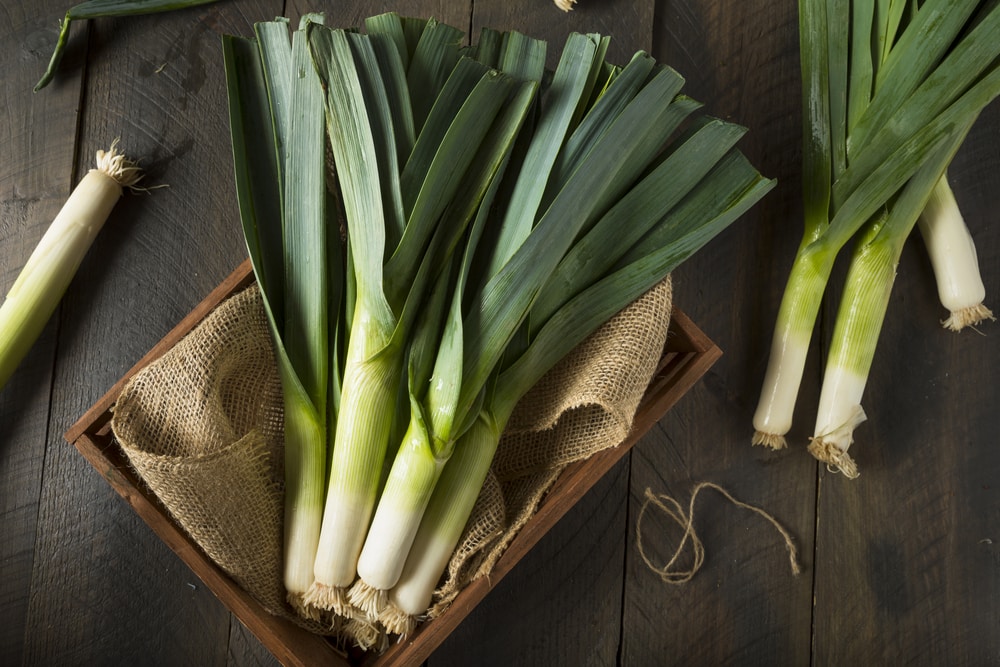
Aside from the different health benefits, differentiating between ingredients can help you better control the flavor of your recipe. It is quite common to see beginners getting confused about what type of greens to use in their recipe. Even though the differences between some ingredients are not that substantial, having a clear idea of their flavor can help you develop a masterpiece. So, try to experiment with different ingredients and test the recipe at every phase.
Recently there have been a lot of queries regarding leeks and chives. If you’re also unsure about which ingredient to add to your dish, then the following details might help you with a better perspective.
Leeks vs Chives
Leeks
When you compare leeks with chives, the biggest difference you will notice will be between the flair of both ingredients. Many experts have pointed out that using leeks in a recipe brings a sweeter flavor to the dish that can be linked closely with an onion. On the other hand, you won’t get the same favor while using chives in your recipe. So, if your dish complements the addition of a sweeter flavor to the recipe, then make sure to go with leeks over the chives.
In most situations, you will notice that users will avoid the use of the top section of leeks in their recipe. Even though the majority of flavor is condensed in the bulb of these greens, you can still make a decent dish by processing the leek leaves. So, if your recipe demands a sweeter taste, going with this ingredient is your best bet.
Now, even though some people believe that it is acceptable to substitute leeks with chives, you will get a noticeable difference in the flavor of the final recipe. So, try to avoid the substitution of these greens with chives if you want to get consistent results while cooking different recipes. The best thing about leeks is their abundance of vitamin K and the blood circulation benefits. Chives can’t match the health benefits of these greens, and if you’re into fitness, then leeks are better for you.
All in all, leeks bring a sweeter flavor to your recipe, and you will clearly notice the difference in the final flavor while using leeks instead of chives in your recipe. So, only rely on this ingredient when you’re pursuing a sweeter flavor and don’t particularly like the flavor of chives. Hopefully, this will help you make better decisions about your recipe.
Chives
Aside from the differences in flavor, you will be able to clearly identify chives from leeks by looking at the base of the ingredient. While you can notice a white section on the bottom of the leeks, you will find the chives are completely green with a slightly yellow bottom. So, keep this information in mind when you go to the market to restock on the cooking ingredients.
As compared to leeks, chives bring a stingier flavor that can be linked closely with scallions. There are also quite nutritious but don’t bring as many circulation benefits or Vitamin K to your table. With that said, you will still get an abundance of calcium and potassium in your recipe while relying on this ingredient. So, if you can’t seem to get your hands on leeks, sticking with chives is also a viable option.
Even though you will get a variation in the flavor of the recipe, it can be managed by modifying the spices in your dish. So, if you have no choice but to substitute chives for leeks and vice versa, make sure to manage the spices in your dish accordingly. That way, you will have more control over the final output, and you won’t be surprised by flavor variation.
All in all, both ingredients bring a ton of benefits to your recipe. While some recipes complement the sweeter flavor of the leeks, others rely on chives to refine the taste. So, you need to follow the instructions on the recipe book to make the final decision. With that said, most experts recommend that you should experiment with both ingredients to get a better understanding of the flavor. That way, you will improve as a cook and develop a better recipe in the end. Hopefully, this will help clear the confusion on whether you should use chives or leeks in your recipe.